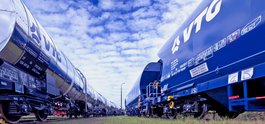Committed to strengthening rail freight: VTG has fitted what are known as quiet brake blocks on its entire fleet in Germany, Switzerland and the relevant border regions. The noisy screech of cast iron blocks is thus a thing of the past. From now on, only composite or disk brakes will be used on VTG wagons. The migration process, which took several years, was thus concluded just in time for the switch to the new rail timetable on December 13, 2020 – which coincides with the enactment of Germany’s new Rail Noise Prevention Act, under which loud goods wagons are prohibited. One key measure to reduce rail freight noise emissions has thus been completed and will ease the burden primarily on people living in close proximity to busy railway lines. VTG alone has converted nearly 30,000 wagons at a cost of millions of euros. “Migrating to quiet brake blocks was a huge challenge in both financial and organizational terms,” says Sven Wellbrock, Chief Operating Officer Europe and Chief Safety Officer at VTG AG. “We are deeply grateful to our customers, without whose flexibility we could never have got this major job done. Together, we have made a crucial contribution to fostering greater acceptance of rail transportation in the population at large.”
Moving to quieter blocks is fundamental to the future of the industry
“For the industry as a whole, migrating all rolling stock to quiet brake blocks is an important step toward future-proof rail freight,” says Dr. Heiko Fischer, Chief Executive Officer of VTG AG. “Rail is critical to greater sustainability and fewer CO2 emissions in the transportation sector. But we must all pull together in the same direction. As a company, we do this by continually investing in technological innovation and ground-breaking digitalization strategies. On top of these efforts, however, rail also needs political and administrative support. This medium can only put its strengths to good use if the right legal and regulatory conditions are in place – in every country and at the European level.”



